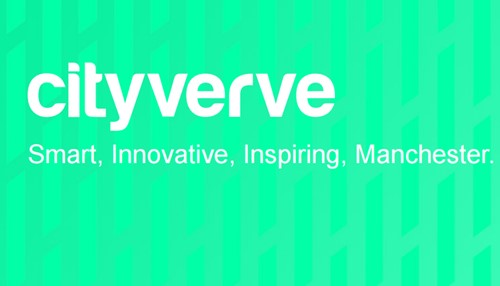The CityVerve Project
The CityVerve Project used Internet of Things (IoT) technologies to help Manchester City Council improve the way it designs and delivers services for the people who visit, live or work in Manchester.

InnovateUK selected Manchester out of 34 applicant cities for the award of £10million to fund and develop the UK IoT cities demonstrator.
The ground-breaking CityVerve project was an ambitious multi-sector consortium, led by Manchester City Council, bringing together global industry partners, leading UK universities, public sector agencies and innovative SMEs.
CityVerve saw Manchester transform into a ‘smart city’ demonstrating the power of IoT technologies to revolutionise and improve city services across health and social care, transport and mobility, energy and environment, culture and the public realm, delivering a smarter city, which is safer and more efficient, with lower environmental impact, increased health benefits, and empowered citizens.
CityVerve aimed to provide a replicable model for other cities to follow in the UK and further afield.
The project demonstrated how multiple IoT Smart City services can utilise key IoT infrastructures such as Hypercat and InterCloud. Such infrastructure allows for rapid scalability and interoperability, and the virtualisation of data, reducing costs and enabling the security of data sharing and allowing real-time access to data. Supported by new technical models for hyper-scalable cloud services, real-time data sharing, and interoperability and integration at the network, platform and cloud levels.
CityVerve demonstrated applications of IoT, adding sensors and data analysis to equipment throughout the city, in four key areas: health and social care; culture and community; transport; and energy and environment. The ‘smart’ improvements in these areas helped to deliver more efficient and personal products and services to Manchester’s citizens, strengthening its stance as a Northern Powerhouse city.
Combining sensors embedded in light fixtures (including environmental sensors), analytics and the existing wireless outdoor infrastructure, created a sensing platform to supporting energy reduction and monitor air quality at different heights and locations.
CityVerve saw ‘flag and pole’ bus stops convert to talkative bus stops with intelligent digital signage and sensors, where people will be able to check-in and let the bus driver know they are waiting.
For the Manchester Corridor, the project promoted bike-sharing schemes and had ‘e-cargo’ bikes to make ‘last-mile’ deliveries along the corridor.
The ‘smart city’ project provided more efficient and personal health and social care:
Sensors embedded in the environment – in lamp posts and street furniture – and wearable sensors supported citizens in increasing recreational and everyday walking. Individuals and teams could be tracked via this network competing against one another to improve health and prevent emerging conditions, enabling preventable costly conditions like diabetes to be caught before they begin, improving the outlook for the long-term sustainability of health and social care.
Data from a range of sensors both inside and outside the home combined with information from IoT networks of air quality and mobility sensors provided information to patients and clinicians to support co- and self-management of chronic conditions such as COPD and other respiratory problems.
Digital Futures Director, Professor Chris Taylor was The University of Manchester Principal Investigator.
